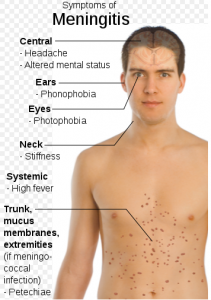Following the confirmed cases of students infected with bacterial meningitis at the University of Oregon, Providence College and Yale University, the Medical Director at Marquette University in Milwaukee has announced a student has been diagnosed with the serious bacterial infection.

In a Public Health Alert Friday, Carolyn Smith, MD said a Marquette student has been diagnosed today with bacterial meningitis and is currently hospitalized. The student is stable and recovering.
This is an isolated case and no other cases have been identified. Marquette University Medical Clinic is working closely with the City of Milwaukee Health Department to initiate the appropriate follow-up communication with any students, faculty and staff who have had prolonged direct contact with the student.
They will be contacted, and the Marquette University Medical Clinic will provide preventive medication (prophylaxis) as appropriate. The student lives in a university residence hall and the student’s roommate has been notified and received preventive treatment. It is important to note that living in the same residence hall does not put students at any greater risk as the disease is not spread by casual contact.
Meningococcal meningitis is caused by the bacterium, Neisseria meningitidis, which causes the most severe form of bacterial meningitis. Meningitis is an infection of the membranes covering the brain and spinal cord. It can also be found in the bloodstream. This particular type of meningitis is very severe and can result in death if not treated promptly. Even in cases where treatment has been given, the fatality rate is around 15%.
The symptoms of bacterial meningitis are sudden, with fever, stiff neck, body aches and headaches. As the disease progresses other symptoms may include nausea, vomiting, photophobia and seizures. A petechial rash seen on the trunk and lower extremities, bleeding complications, multi-organ failures and shock are usually final signs. This disease has the ability to kill within hours of getting it.
Up to 10-20% of older children and young adults carry this organism in the mouth and nose, though the carriage rate will vary with age and closeness of population. The majority of people that carry this bacterium have no clinical disease. The organism is spread person to person through respiratory secretions from the nose and mouth (coughing, sneezing and kissing). Experts are unsure why some people advance to meningitis disease while many do not.
Crowded living conditions facilitate the spread of the organism and places like military barracks and college dormitories are well documented areas of concern with this disease. For more infectious disease news and information, visit and “like” the Infectious Disease News Facebook page.
Students or parents can contact the Marquette University Medical Clinic at (414) 288-7184.

